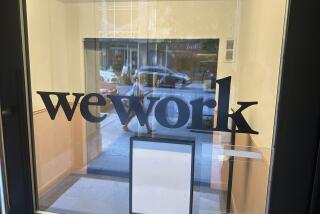Employees Have a Big Stake as Firm Emerges From Ch. 11
- Share via
Suzan Bahl’s friends told her she was crazy. But she kept reporting for work at Media Systems Technology, even after the ailing Irvine technology firm slashed salaries, laid off about half the work force and filed for bankruptcy protection.
Now, after three years of uncertainty, Bahl, 26, has something to show for her tenacity: She has become one of MST’s new owners.
“Some of my friends told me what a fool I was for staying here,” Bahl said. “It felt good to call them back and tell them my foolishness paid off.”
Under an unusual Chapter 11 reorganization approved by U.S. Bankruptcy Judge Donnal Sullivan, effective June 6, MST’s remaining 31 executives and employees received a 51% controlling interest in the revitalized company in return for the 10% salary cuts they took and the extra hours they worked during the reorganization. The company’s four executives hold a total of 40% of the shares while its 27 employees share an 11% stake.
The remaining 49% is held by MST’s unsecured creditors, who have forgiven the $1.6 million they were owed by the company in exchange for their minority stake.
In all, MST’s shareholder equity is valued at about $1.2 million.
According to MST executives and others involved in the reorganization, the plan appears to have broken new ground in bankruptcy proceedings by allowing management and employees to obtain a controlling interest in the firm.
“The creditors, since they were converting all of their debt to equity, wanted to retain the current management and employees,” said bankruptcy attorney Bruce Kennedy, who represented MST in the case. “In order to retain them, they agreed to give them significant stock ownership in the revitalized corporation,”
“Normally you don’t see equity going to employees,” Kennedy said. “But the employees stuck with the company through all the hard times. They took wage concessions. They worked longer hours. They took multiple jobs. They cut back to bare bones. Everyone pitched in and made this reorganization go.”
Credit for the novel reorganization is generally given to MST President Al Cosentino, a veteran Orange County technology executive who was recruited by the company’s directors in 1984 to turn the ailing operation around.
“My negotiating position was simple,” said Cosentino, 51. “Every employee who stuck it out through the bankruptcy proceedings was going to get a cut of the company. It was based on what they had contributed over the last two years.”
Founded in 1979, MST was a pioneer in the field of computer disk duplication. The company manufactures a line of duplicators, ranging in price from $5,000 to $60,000, used by software manufacturers and others to make multiple copies of software recorded on floppy disks.
Like Office Copiers
The machines MST makes are the computer industry’s equivalent of the office photocopier. Slip a master floppy into a slot, press a button and an hour later you’ve got 300 more floppies just like the first.
Although the firm’s initial products proved successful, MST became a victim of excessive optimism on the part of its previous management team.
In 1983, based on projections that annual revenue would mushroom from $5 million to $20 million within a year, MST obtained venture financing to relocate to a 75,000-square-foot facility on Armstrong Avenue in Irvine and signed a seven-year lease requiring rent payments of approximately $1.2 million per year.
The timing couldn’t have been worse. Instead of increasing, MST’s revenues began to decline as other manufacturers introduced competing products and the overall market for computer products began to soften.
When Cosentino arrived at MST, the cavernous manufacturing complex reminded him of a morgue. “It had that feeling of emptiness, like a company going out of business,” he said. It proved to be an apt assessment.
After struggling for months to arrange a settlement with MST’s landlord and other creditors, Cosentino packed the company’s bags, moved into smaller quarters and filed for reorganization and protection from creditors under Chapter 11 of the federal bankruptcy code.
“We did it primarily to get out of the building,” he said. “We were in a 75,000-square-foot facility, and all we needed was 15,000 feet. We did all the traditional cost reductions: people, equipment, everything. But we just couldn’t raise enough money because of the drain from that building. It was obvious we had to get out.”
MST relocated in a 14,000-square-foot facility on Hale Avenue with annual rent of about $100,000. The move and subsequent bankruptcy filing reduced the company’s remaining obligation under its previous lease from more than $5 million to about $900,000.
Unit Sold to Raise Cash
The company also sold its interest in a unit called Media Duplication Services for about $300,000, enabling it to pay off its secured creditors.
Eventually, the unsecured creditors, including the previous landlord, agreed to forgive the remaining debt in return for their equity stake.
Cosentino, who received a 20% stake in the reorganized MST, said that business improved while the company was reorganizing. Within the last few weeks, MST has received about $500,000 in orders from IBM, AT&T;, DEC and Compaq, among others, he said.
Before the reorganization, MST’s liabilities substantially exceeded its assets. Today, Cosentino said, MST has about $2 million in assets and $800,000 in liabilities. Sales are projected to reach $4 million during MST’s 1987 fiscal year.
The novel equity distribution has had a positive effect on company morale, he said.
Bahl, a records management employee, said she likes having an ownership share.
“It made me feel like somebody,” she said. “And it’s changed my attitude.”
For example, Bahl said she is more careful about ordering supplies and equipment for her office.
“I watch my spending. That money is mine. Any company money I spend comes out of my pocket, one way or another.”
More to Read
Inside the business of entertainment
The Wide Shot brings you news, analysis and insights on everything from streaming wars to production — and what it all means for the future.
You may occasionally receive promotional content from the Los Angeles Times.










